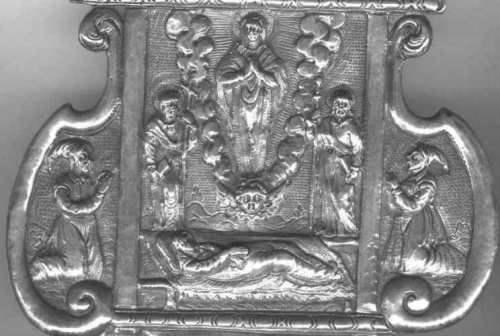click on images to enlarge
AN ANCIENT LITURGICAL OBJECT: THE 'PAX'
The 'PAX' (note 1) is an Eucharistic tablet decorated on the
front with a Sacred Scene that was kissed by the priest celebrating the
Mass, then offered to the kiss of other officiates and, finally, to the
faithful.
It was called 'osculum pacis' or 'tabella pacis' and was
used since the 13th century replacing the ancient 'kiss of the peace'
which preceded the Holy Communion.
The ancient use of the 'PAX' is certified by the mention of the 'osculatorium'
on Archbishop of York Walter de Gray's Statutes (1250).
The 'PAX' was usually rectangular (but there are some round examples)
with a small base and a handle for its standing (it was used also as a
small portable altar).
The ' PAX ' was made of many different materials (gold, silver, bronze,
ivory, glass) and different and often conjoined techniques (embossing,
bas-relief, niello, engraving, enameling). (Dizionario di
Antiquariato - A. Vallardi-Garzanti, Milano 1992)
Here below are the images of four silver 'PAX' made in Venice in 18th
century.
 |
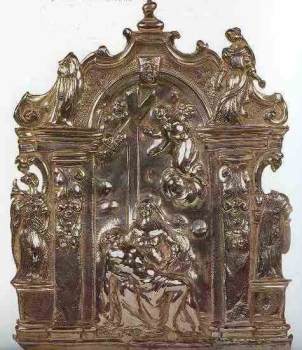
|
The Virgin Mary with Children
and Saints |
Our Lady and Dead Christ |
 |
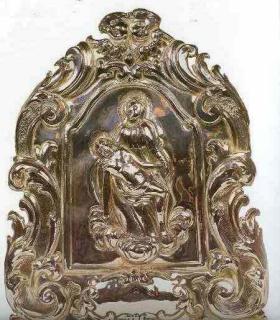
|
| The Virgin Mary with Children |
Our Lady and Dead Christ |
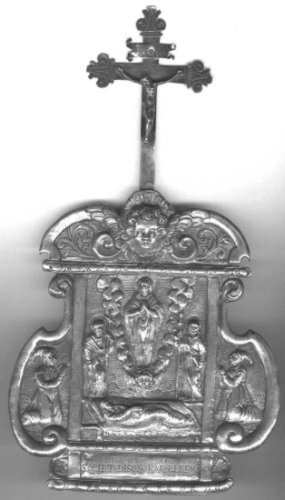 This is the detailed description of an item made in Genoa (Italy).
It is a thin sheet of silver, embossed and chiseled, weighing 7.7
oz. (220 grams), 10 1/4 in. high (26 cm.) including the die-cast
crucifix on a laminated cross. The plate is 6 1/2 in. tall (cm.
16,5) and 6 in. wide (cm. 15).
This is the detailed description of an item made in Genoa (Italy).
It is a thin sheet of silver, embossed and chiseled, weighing 7.7
oz. (220 grams), 10 1/4 in. high (26 cm.) including the die-cast
crucifix on a laminated cross. The plate is 6 1/2 in. tall (cm.
16,5) and 6 in. wide (cm. 15).
The iconography represents the death of the Virgin Mary lying on the
bed (note 2) and Her Assumption to Heaven.
This image is inspired by an ancient Byzantine icon in Middle-East
style preserved in the Sanctuary of Our Lady of Montallegro in
Rapallo, representing the Heaven ascent of Mary.
On the sides there are two Saints: on the left St.John with the
cross and on the right St. Roch with the pilgrim's stick.
|
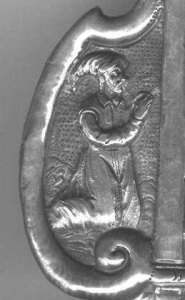
In the side ledges two kneeling 'brothers':
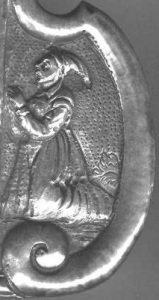 the figure on the right, with more fluttering clothing and of more
feminine appearance presumably is a 'sister'.
the figure on the right, with more fluttering clothing and of more
feminine appearance presumably is a 'sister'. |
The Latin inscription on the base reads:
SOCIET (IS) societatis
DISCIP ( M) disciplinatorum
RAP (I) Rapalli
ELEEM (A) elemosina (nti)
1617
(a rough English translation is: CHARITY'S BROTHERHOOD OF RAPALLO - 1617)
This means that the 'PAX' was ordered by a 'Confraternita'
(brotherhood) or 'Casaccia' (Societatis Disciplinatorum) having as
objective the moral rigour, the penitence (scourging) and the charity,
operating in the 'Oratorio dei Bianchi' (Oratory of the 'Whites') still
existent in Rapallo (the'Whites' perhaps derives from the color of their
garments).
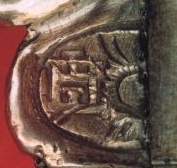 On the bottom left there's the 'torretta' hallmark and on the right
side the silversmith's monogram C B.
On the bottom left there's the 'torretta' hallmark and on the right
side the silversmith's monogram C B.
A doctoral thesis on 'Genoa's silversmiths of 17th century' assumes
that the 'PAX' was made by Flemish silversmith Cornelius Braj,
active in Genoa in the first half of 17th century.
The error of the double EE on the inscription of ELEMOSINA would be
a confirmations of this hypothesis.

|
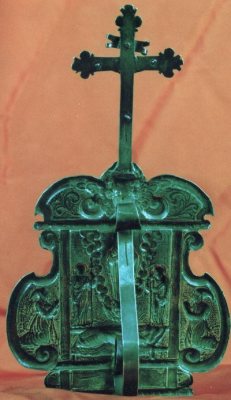 This item is of exceptional rarity and among the more ancient silver
objects hallmarked 'torretta' (1617), so that even the prestigious
Saving Bank of Genoa's collection has no item of similar age.
This item is of exceptional rarity and among the more ancient silver
objects hallmarked 'torretta' (1617), so that even the prestigious
Saving Bank of Genoa's collection has no item of similar age.
The 'Repubblica Democratica Ligure' of 1798 ('Democratic Republic
Ligurian') and later the Napoleonic occupation left partly untouched
the silver of persons and of Church property but expropriated the
silver belonging to 'Confraternite' (brotherhoods).
The devotional silver 'not tightly necessary to the religion' (as
the 'PAX') was expropriated, saving from melting only Chalices,
Monstrances and thuribles.
The confiscation included the 'PAX', the processional maces, the
'crowns of thorns', the nails of the processional crosses and any
other silver equipment belonging to the 'Confraternita'.
|
(1) 'pax' is a Latin word. In English it means 'peace'
(2) the Catholic Church uses the Latin definition 'Dormitio
Virginis' (Virgin Mary's sleep)
|
Giorgio Guida
Giorgio Busetto -
www.silvercollection.it
- 2005 -
English text revision: Jayne Dye
|











